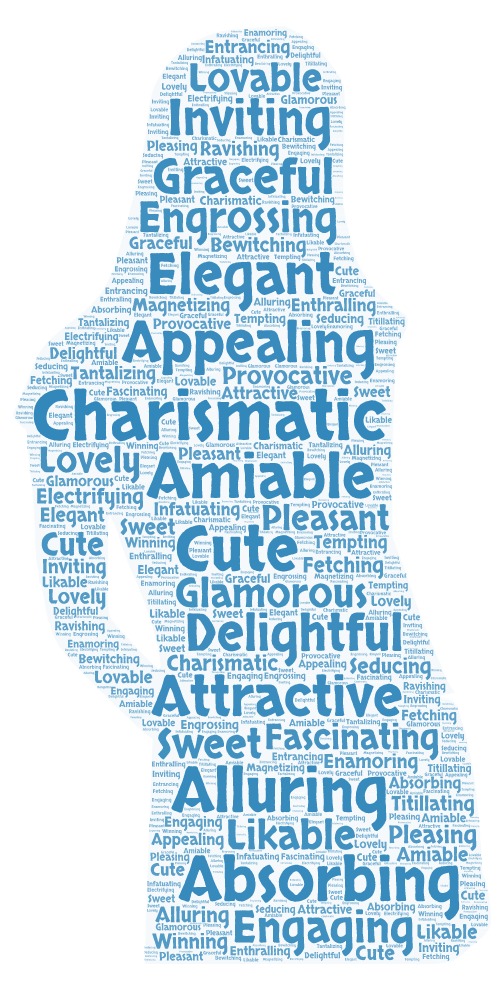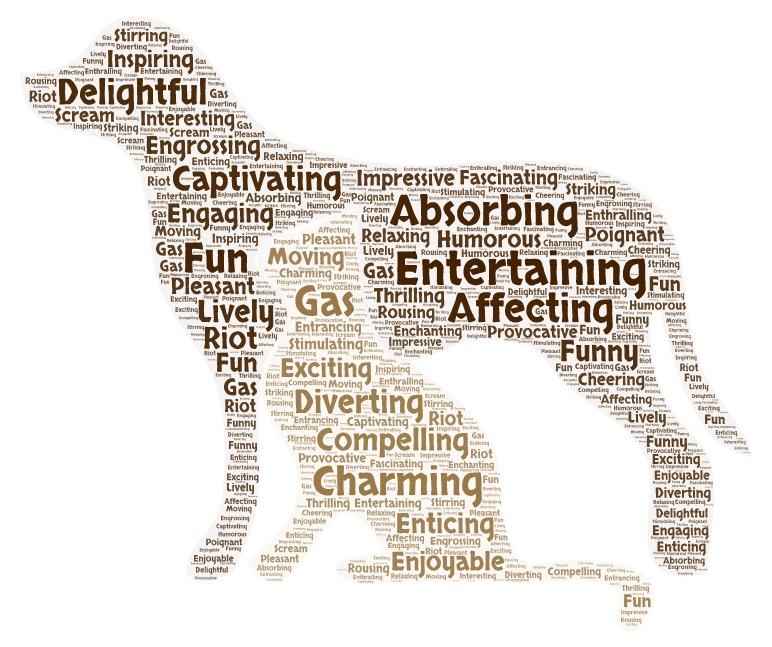Suppose you were a TV producer charged with launching a new dog training show on your network. Or in this day and age, your medium might not be television but any kind of video streaming service.
How would you go about doing that?
Which criteria would be important in outlining the show?
Some may say: you need to find a charismatic trainer, to serve as host.

True.
That’s not all, though. I wouldn’t even start there.
To gather a mass of loyal viewers, you’d have to offer a show that helps people develop better relationships with their dogs, shows them how to prevent and solve behaviour problems, and teaches them how to train their dogs to adapt to living with people.
Besides the personality of the trainer, I can think of three topics that are equally important when planning a successful dog training TV show. In my mind, they’re all necessary conditions.
Let’s call them the three E’s.
The show needs to be:
- Entertaining
- Educational
- Ethical
I’ll take a moment to discuss these crucial fundamentals.
TV dog shows should be Entertaining
If it’s not engaging, people won’t watch it.
This is a dilemma. Some modern humane dog training techniques are mind-numbingly boring to watch. Systematic desensitization may take hours, even days, and it may seem like nothing is happening.
Sort of like watching paint dry.
However, with creative editing, a charismatic host and powerful storytelling, that problem can perhaps be overcome. We might even make a thing out of it:
“look how boring and time consuming this SD/ CC procedure is! But it works, folks!”
And we might also refocus, rather than solving behavioural problems (which is what most dog TV shows are about), our show might be about how to prevent them, or simply about how to go about training animals. How to get desired behaviour, not how to get rid of undesired behaviour. This has two advantages:
- There’s heaps of fun and creative training procedures that could be showcased.
- In some cases, undesired behaviour melts away and shrinks as the desired repertoire is increased – without even having to address the problem head on.
Producers, please don’t show the trainer intentionally provoking animals into fearful or aggressive emotional states.

The snarling dog lunging at the trainer may be exciting to watch, even entertaining to some. The problem is that it violates the other two conditions. In addition, it’s dangerous. People on TV being confrontational to dogs get bitten, and the viewers watch and learn. The “don’t try this at home” warning is likely completely ignored.
Also, animals in highly aroused emotional states may change their behaviour without actually learning what’s intended. They may stop growling because they’re afraid or have given up, not because they’ve learned that they’re “not supposed to growl”. In other words, the problem behaviour may still be there, it’s just that we’re not seeing it in the current context. It will just resurface some other time.
Which brings us to the next fundamental.
TV dog shows should be Educational
If you’re airing a TV dog training show, you are an educator.
You educate, whether you realize it or not.
People will imitate whatever the charismatic TV dog trainer does to deal with behavioural problems. In my opinion, dog TV shows need to step up and take responsibility for the training techniques that they advocate.
Is there a need for education, you might ask?
Well, yes. A big need, in fact. In the US, about 1-2 people out of 1000 gets bitten by a dog severely enough to require a visit to the emergency room, every year.
Most are children. Bitten in the home.
Several important scientific studies have examined the correlation between confrontational, punishment-based dog training techniques and aggression / misbehaviour.
One found that “dogs trained using punishment are no more obedient than those trained by other means – and they exhibit increased numbers of potentially problematic behaviours.”
Another study affirmed that confrontational methods increase aggression.
In other words, punish your dog and he is more likely to bite.
Contrary to the belief expressed by some TV dog personalities, dog aggression towards owners is not dominance-related but often an effect of inadvertent training.

There is a clearly a crying need to educate the public on how to manage dog behaviour. Luckily, there are science-based, proven, and humane techniques that effectively reduce aggressive behaviour.
Producers, please don’t show confrontational techniques that risk aggravating the problem behaviour, create new problems – or result in more dog bites.
TV dog shows should be Ethical
This condition may be the last on the list, but it’s as important as the other two.
Dog training techniques should be chosen with the animal’s best interest at heart.
Why? For three reasons:
- Out of courtesy to the animal, so that he may learn to cooperate without being bullied or hurt. He’ll be better off and the quality of the dog-human relationship will improve.
- To reduce the risk of injuries, as discussed above.
- To increase children’s prosocial skills.
If a dog trainer on TV is charismatic, compelling, and a good educator, people will start copying the techniques. In turn, they will model those techniques to their children. In other words, the TV dog trainer will indirectly influence kid’s kindness and caring towards animals. And it’s a well-known fact that if kids learn to be nice to animals, they become nicer to people, too.

Producers, please don’t show TV dog trainers intentionally causing pain, discomfort of suffering to dogs.
It doesn’t benefit the animal, it’s unethical, dangerous and often ineffective. The audience gets desensitized – and children don’t get the added benefit of improved humane attitudes.
If you are that TV producer, give this some serious thought. The ethical perspective is not some insignificant detail – it could actually make the world a better place, and perhaps put a dent in that depressing statistic on dog bites.
Conclusion
Dog training shows influence how people interact with their dogs, and careful thought should therefore go into considering what kind of viewer learning is desired. Confrontational methods may be entertaining to some viewers, but they increase aggression, are unethical and often ineffective. In fact, there are at least 20 problems with punishment.
If, on the other hand, the show is ethical and educational, dog aggression may be reduced, resulting in fewer relinquishments and dog bites. In addition, children may develop prosocial skills by learning to treat animals kindly.
***
Are there any dog shows that fulfil all criteria, which are Entertaining, Educational and Ethical? I can think of three, but I’m sure there are others:
It’s me or the dog – with Victoria Stilwell
Talk to the animals – with Ken Ramirez
Nightmare pets SOS – with Craig Ogilvie, Chirag Patel, Sarah Fisher and Johanna Headley
Can you think of any other TV dog show that fulfills the 3 criteria? Perhaps they abound in some countries..? Let us know in the comment’s section, below! I’ll ask you not to go on a rant about any TV dog shows that don’t fulfill the criteria.
***
Want to learn more? I give online courses about how to get happy, reasonably well behaved animals that thrive with people. They’re only available occasionally, so sign up below to be kept in the loop! I’ll also keep you updated on free webinars, masterclasses, and mini courses – as well as new blog posts!
Ascione & Weber (1996). Children’s attitudes about the humane treatment of animals and empathy: One-year follow up of a school-based intervention.
Herron et al., (2009). Survey of the use and outcome of confrontational and non-confrontational training methods in client-owned dogs showing undesired behaviors.
Hiby et al., (2004). Dog training methods: their use, effectiveness and interaction with behaviour and welfare.
19 replies on “Why dog training programs on TV should be entertaining, educational – and ethical”
My cat from hell, Jackson Galaxy.
His main focus when trying to solve a problem is to look at the environment the cat lives in, the routines in the household and to make sure that the cat’s needs are being met. It’s never ever about the cat being a bad cat.
He’s charismatic and a good teacher.
Yes, Jackson Galaxy! 🙂 He’s done some great work!
Me and My Dog, UK, BBC2. 2015(ish), repeated last year. Great.
https://www.bbc.co.uk/programmes/b08lnlqg
https://www.developingdogs.co.uk/trainers/sian-ryan/
Thanks for sharing, Francesca! 🙂 I haven’t seen it, but looks like many different great ways to build relationships and do fun things together! 🙂
That’s exactly what it was, with bits of dog-science reported in interesting and accessible ways. And I’ve just remembered a new one here last year with Chirag Patel and Nanci Creedon called Cats and Dogs at War. It’s still available to stream and it’s nice to see further follow up from the participants on Chirag’s FB page.
https://www.channel5.com/show/cats-and-dogs-at-war
ooh, nice, thanks for sharing! 🙂
Fra bølle til Bedste ven. A show from Norway. Rather new if I recall correctly
Great, thanks for sharing Laura! 🙂
I recently watched a U.K. dog trainer tv series that is being shown overseas, and was aghast to see the techniques that were being used, particularly in this modern age! I felt embarrassed that this trainer is regarded and promoted as a “top trainer in the UK”, and that these techniques are being shown to the general public, who no doubt attempt to copy them without questioning, because sadly they know no better. I hope that more shows are created that encompass what you have written above, to foster better understanding amongst the general public of these incredible animals needs and emotions, and our relationship with them.
I think very often TV producers go about creating a dog show using completely different criteria than those I listed…
Hi Carolina. I am in fact going to do a tv programme about how to teach a dog to run agility, so your blog post gave me something to think about before we get started!
A journalist and her whippet will join my class, and she will bring a photograper. I expect a lot of fun for all of us! 🙂
Wow, sounds really interesting! Best of luck! 🙂
I have trained dogs for many years in the sport of IGP/ schutzhund/ mondioring.
Working high drive dogs with police, airforce & army dog handlers.
They have to sometimes use positive punishment but they are skilled & fair. The dog is rewarded & enjoys the training yet has a high degree of self control & trust in their handler.
I’ve seen those things done without punishment. Why do some trainers have to use it and some don’t?
I’d say it depends on the trainer’s learning history. You do what you’ve been shown – and changing your own behaviour, once established, is difficult!
It is disconcerting, isn’t it..?!
Saw this interview the other day where a 2018 book on training dogs was being presented. Despite the results of the training this owner is doing to the animal animal isn’t obviously working, many people could still take this as the way a dog must be educated or erroneously think that this is the type of interaction is being advocated also in the book wrote by the lady. https://www.cmjornal.pt/multimedia/videos/detalhe/cao-educado-dono-feliz
… sorry my Portuguese is not good enough – and I didn’t see any training?
[…] problematic pet behaviour should not propagate potentially harmful, outdated techniques but be ethical and educational, not simply entertaining – but that’s not always the […]